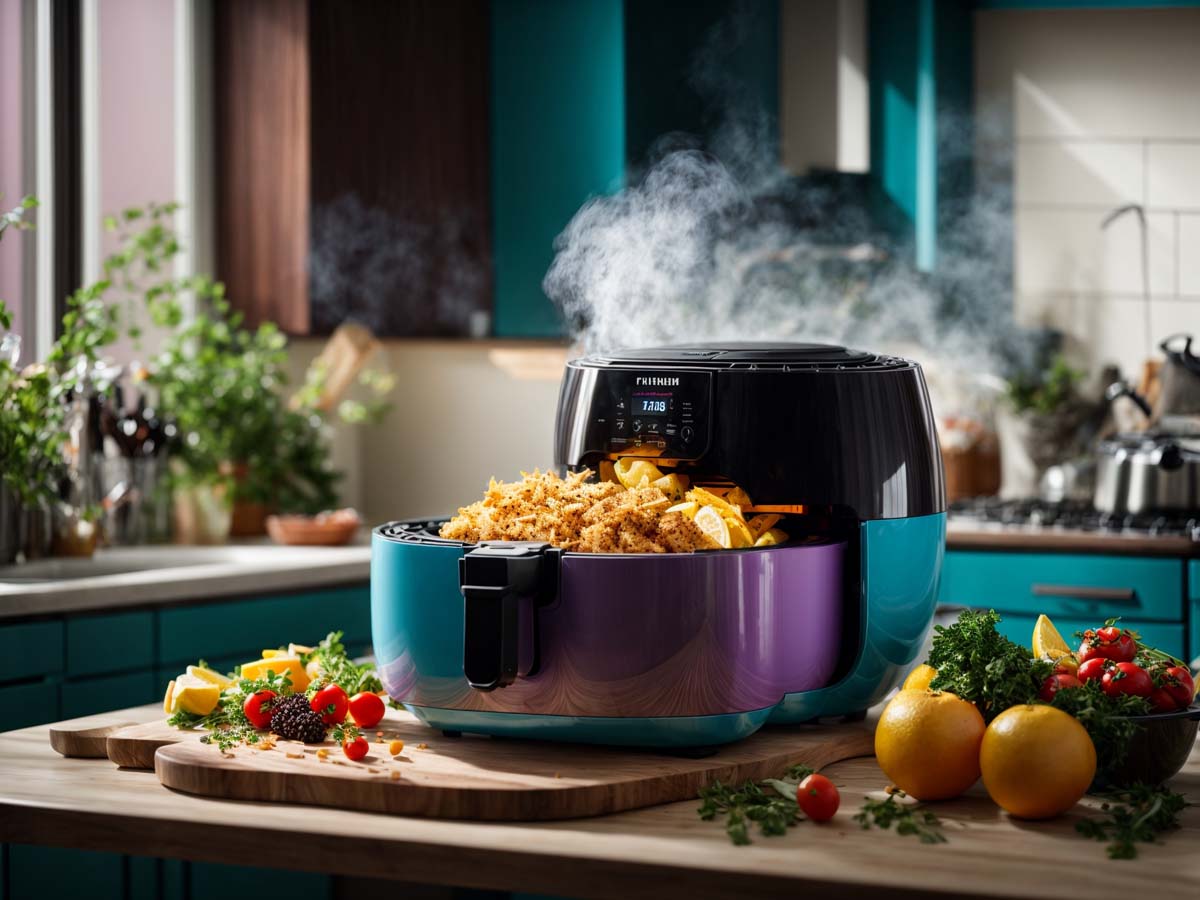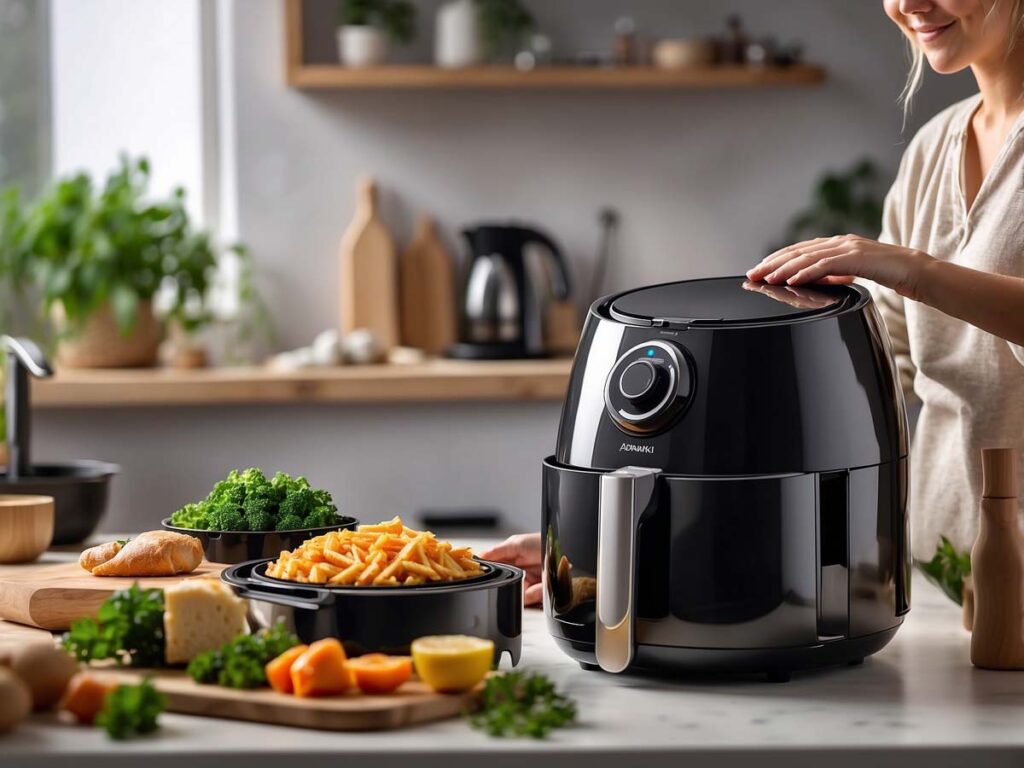Is the Air Fryer Plastic Smell Toxic? Safe Usage Guide

The plastic smell from air fryer is typically not toxic; it often results from manufacturing residues and usually diminishes after a few initial uses, but it’s important to ensure proper cleaning and maintenance for safe usage.
Air fryers have become a staple in modern kitchens. They’re loved for cooking with less oil, making meals healthier. But that new appliance smell, especially the plastic odor, raises some questions.
Is it just a temporary thing, or a sign of something unsafe? People are rightly concerned about what they’re breathing in and eating. It’s key to get to the bottom of these air fryer safety issues.
Understanding what causes this plastic smell is crucial. In the following sections, we’ll explore this topic more. We’ll uncover the truth about air fryers and this peculiar odor.
Is the Air Fryer Plastic Smell Toxic?
In short, the plastic smell from the air fryer is generally not toxic, usually stemming from manufacturing residues that dissipate after initial use, but proper cleaning and maintenance are crucial for safety.
When you first use an air fryer, you might notice a plastic smell. It’s common and has sparked a lot of discussions.
The smell comes from the plastic components in the air fryer. They can emit an odor when heated, especially when the appliance is new.
Now, is this smell harmful? It’s a valid concern. Most air fryers are made to be safe. But, the potential for toxic chemicals releasing is something to consider.
The risk mainly depends on the type of plastic used. Understanding the air fryer design and materials is crucial here.
Identifying Harmful Compounds in Plastic
Let’s talk about what’s in the plastic. Some air fryer plastics might have BPA or phthalates. These are chemicals that have raised health concerns.
BPA is linked to various health problems. It can leach into food, especially when heated.
Phthalates are another concern. They make plastics flexible. But their chemical properties might pose health risks.
The good news is many air fryer makers now avoid these chemicals. They know the risks and are careful with the materials they use.
Understanding the Impact of Heat on Plastic
Heat changes things, especially for plastics. In air fryers, heat exposure can lead to plastic degradation. This means the plastic might break down a bit and release some chemicals.
But here’s what you should know. Most air fryers are built to handle this heat safely. The amount of chemical release is usually very small.
It’s still important to follow safety guidelines. Cleaning your air fryer well before first use is a good practice. It helps reduce any initial smells.
Tips for Reducing Plastic Smell in Air Fryers
Got that new air fryer but bothered by the plastic smell? Let’s fix that. There are a few things you can do to minimize or even get rid of this smell.

First off, consider cleaning methods. A thorough clean before the first use is key. This can help lessen the smell right away.
Next up, air fryer maintenance. Keeping your air fryer clean is not just about odor reduction. It’s also about making sure it works well and lasts longer.
I’ve got some user tips that’ll make a world of difference.
Selecting the Right Air Fryer: Material Matters
Choosing an air fryer isn’t just about the price or features. The smell issue starts right at the selection phase. Go for an air fryer with safer material composition. This is crucial to avoid that pesky plastic smell.
When you’re in the market, look at air fryer selection carefully. Check material safety. Read product reviews.
They can give you real insights into whether an air fryer tends to have a strong smell. Opt for low odor appliances.
Picking the right air fryer can make all the difference. Some materials are just better at keeping odors at bay. Take your time to read through reviews before buying. Look for models known for being odor-free and focus on safety.
Regular Maintenance and Cleaning Practices
Now, let’s talk about keeping that air fryer in top shape. A good cleaning technique can greatly reduce plastic smells.
Follow the user manual for the best cleaning methods specific to your model. It’s not just about smell. It’s about health safety.
Develop a solid maintenance routine. Regular cleaning and upkeep are essential for air fryer maintenance. This isn’t just for odor control.
It’s also for long-term appliance care. Think of it as preventive measures. A well-maintained air fryer performs better and lasts longer.
Keeping your air fryer clean is key. It’s not just about wiping it down. Here’s how you can keep those smells away:
- Start with the user manual. It’s your best guide for specific care instructions.
- Clean it after every use. Use warm water, a bit of soap, and a gentle sponge.
- Occasionally, it might need a deeper clean. A paste made from baking soda and water works well for tough spots. Apply, let it sit, then scrub gently.
- Keep an eye out for any damage. Worn-out parts can lead to smells and should be replaced as soon as possible.
- Make sure it’s dry before you put it away. Leftover moisture can lead to mold and other unwanted smells.
By staying on top of cleaning and choosing the right air fryer, you’ll be all set. These tips aren’t just about keeping smells away. They’re about keeping your air fryer in top shape for years to come. Got any more questions or need advice on another topic? Just let me know!
To know more: Can You Put Water in an Air Fryer to Steam
Expert Insights on Air Fryer Safety and Usage
When it comes to using air fryers, getting tips from those in the know can really up your game. Chefs and appliance pros have a wealth of knowledge to share. Here are some top chef recommendations and expert advice for safe usage practices.
First off, chefs love how versatile air fryers are. But they stress the importance of not overcrowding the basket. It’s all about giving your food enough room to get that perfect, even crispiness.
Then there’s temperature control. Experts remind us that each dish might need its own setting. It’s not one-temp-fits-all. So, getting familiar with your air fryer’s settings can make a big difference.
And let’s not forget about safety. Keeping your air fryer in a clear, ventilated space is key. It’s not just about performance; it’s about keeping your kitchen safe too.
Also learn: Do Air Fryers Need Oil
Ensuring a Safe and Enjoyable Air Fryer Experience
To wrap it up, a safe cooking experience with your air fryer is totally achievable. Remember, choosing the right model and staying on top of cleaning are your first steps to a smell-free kitchen.
Taking advice from the pros can elevate your dishes and keep things safe. It’s all about making space for health-conscious cooking without compromising on flavor.
So, keep these tips in hand, and you’re all set for a fantastic cooking journey with your air fryer. Happy frying!
See all in at KitGiz for Knowledge about Air Fryer and Care & Using guides.
